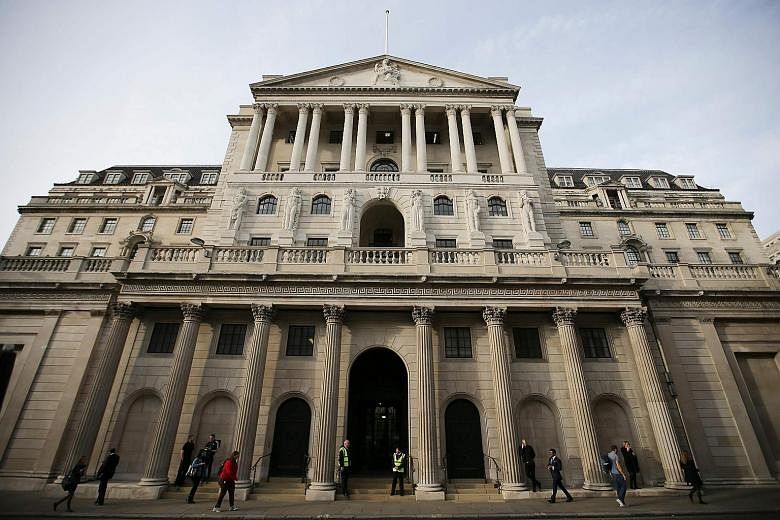LONDON • Now that the Bank of England (BOE) has raised interest rates for the first time in a decade, it is beyond doubt major central banks in industrialised economies are eager to shift away from ultra-easy policy.
But the fact the decision was so contested both in and outside the BOE perhaps reveals more concern about the lack of inflation pressure than about Britain's clear difficulty in trying to leave the European Union without a concrete plan.
The majority of those who argued against higher rates in Britain started with the fact that above-target inflation is a result of sharply higher import prices due to the tumble in the pound since the June 2016 vote to leave the EU.
A lack of domestic inflation pressure from higher wage deals remains as plain as ever, as does the ongoing lack of inflationary drift from the global economy, where trade is down from boom years but cheap labour remains plentiful.
Among those who carefully follow Britain's peers in the Group of Seven industrialised economies, notably the United States and those in the euro zone, the lack of inflation is real and striking, corroborated by a recent Reuters poll of over 500 forecasters around the world.
News that Mr Jerome Powell will be taking over as Federal Reserve chair does nothing to change the fact that core inflation on the central bank's preferred measure has fallen back to 1.3 per cent, where it was the month before the Fed started raising rates nearly two years ago.
The Bank of Canada has delivered two interest rate hikes this year but growth has since flatlined and there's no sign of core inflation picking up there either.
The European Central Bank has just skilfully engineered a broad acceptance that January is the right time to slash its monthly asset purchases by half to €30 billion (S$47 billion). But core inflation is still going nowhere fast.
Japan, like the euro zone, is experiencing one of its best economic years in the past two decades.
But its notable recent improvements in raising wage settlements a bit still does not look like they will bring inflation much higher.
The Bank of Japan's latest meeting had a newcomer arguing for more easing, a crack in the armour that leaves a rather uncomfortable question lingering in the air.
If Japan still has not escaped from two decades of near-zero pricing power, even after the authorities have thrown everything at it, isn't the logical conclusion that central banks aren't in control of inflation?
That is the challenge the BOE will have in coming months: persuading anyone who will listen that by raising rates a tiny amount from near-zero to just a little above zero, it was instrumental in bringing Britain's inflation under control.
It is also worth noting that as central bankers change their tune on inflation from tentative to more emphatic hopes for a revival, some very powerful disinflationary forces in the global economy remain.
While labour unions everywhere are pushing for better pay, the most powerful pull for consumers appears to be the search for a good bargain.
Amazon, synonymous with "instant" and "cheap" and a website many check on their phones against prices while in shops for just about any item, is rapidly growing.The other clear disinflationary risk, even if price pressure does pick up in the interim, is that on more than a few measures, global asset prices look extremely stretched.
REUTERS

